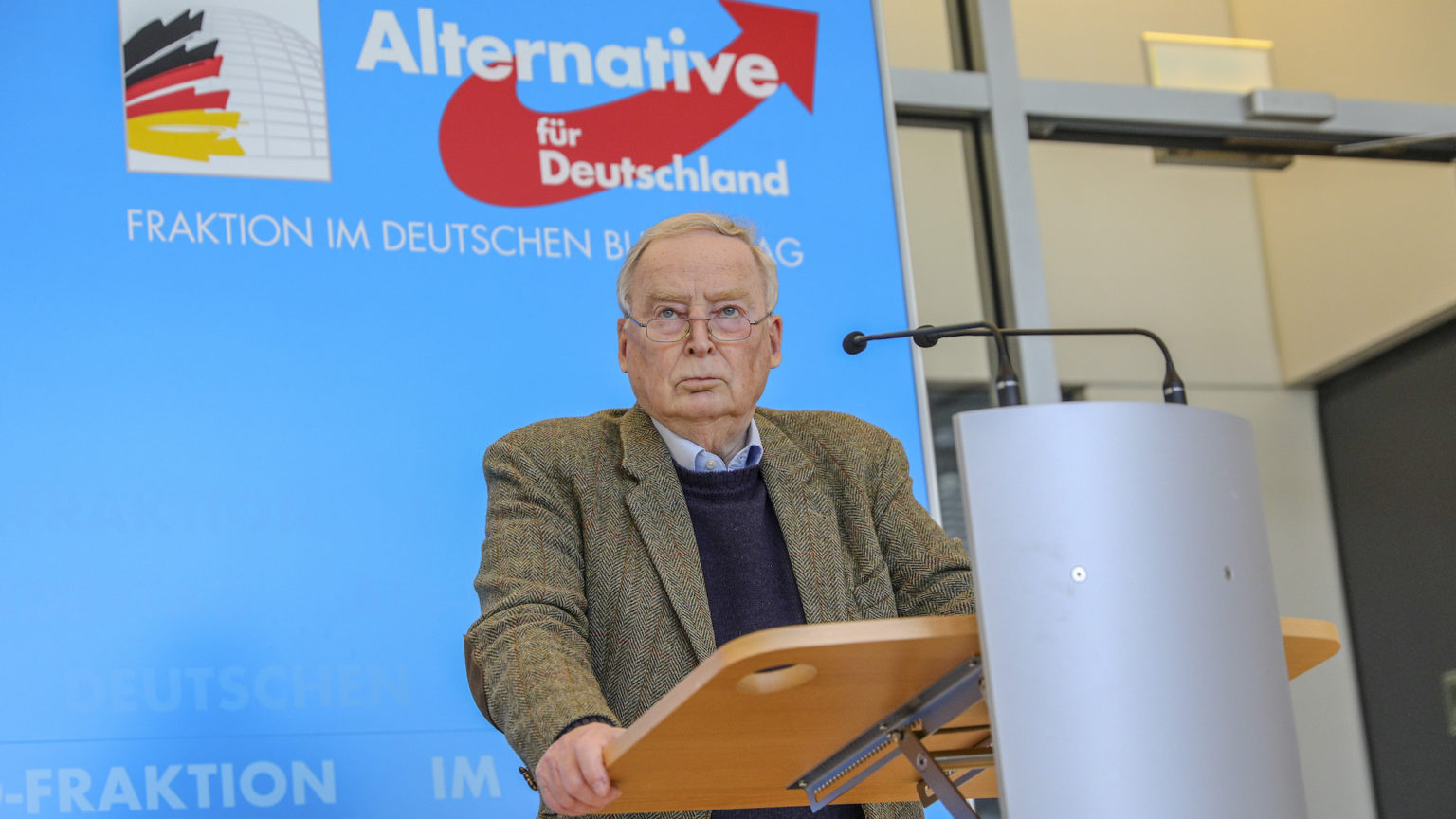Germany’s authoritarian war on populism
The secret service has placed the AfD, the largest opposition party, under surveillance.

Want unlimited, ad-free access? Become a spiked supporter.
Germany’s biggest opposition party, the AfD (Alternative für Deutschland), is due to be placed under state surveillance by the secret service. The Bundesverfassungsschutz (the Federal Office for the Protection of the Constitution, or BfV) announced last week that it intends to collect data on party members, tap their phones and monitor their movements. The surveillance is supposed to establish whether the AfD should be classified as a right-wing extremist party.
For the AfD, this is a serious problem. There will be two important state elections later this month – in Baden-Württemberg and Rhineland Palatinate – and the General Election is in September. The party has filed a lawsuit against the decision – and for now the courts have suspended the surveillance until the legal challenge concludes.
But even the state’s intention to surveil the AfD is deeply troubling. Anyone who publicly supports the party could risk serious personal consequences. In Germany, members and sympathisers of extremist parties can be dismissed by their employer. Public-sector workers – civil servants, teachers, police officers and others – will be especially exposed. The message of last week’s announcement is clear: anyone who wants to join the party or actively support its election campaign should think twice. The same applies to anyone who might want to invite an AfD member for a public debate. The BfV’s announcement will have an extraordinarily chilling effect on German politics.
To understand how this is possible, we have to go back to the time after the Second World War, when the Federal Republic of Germany was conceived as a ‘wehrhafte Demokratie’ (defensive democracy). Democracy, it is argued, must be protected from those who aim to weaken it from within. The justification for this principle was of course the rise of the Nazis in the 1930s and Hitler’s seizure of power, which many commentators still erroneously claim happened through ‘democratic means’. (This interpretation ignores quite a few historical facts.)
From the beginning, the BfV – established in 1950 by the three American, British and French-allied High Commissioners – was an important pillar of Germany’s defensive democracy. Since 1955, the service has been under the control of Germany’s Ministry of the Interior.
The AfD is by no means the first political party or organisation to have been targeted by the BfV. In the early 1980s, the Green Party – which back then was a radical, anti-establishment party, unlike today – was observed by the BfV. Following German reunification, the PDS (Party of Democratic Socialism), and its successor, Die Linke (Left Party), attracted the BfV’s attention. It was only in 2013 that Germany’s highest court banned the BfV from observing Bodo Ramelow. Ramolow – a leading Left Party politician, who has served as the mayor of Berlin and is currently the state premier of Thuringia – is now, ironically, seen as a bulwark against the AfD.
Until very recently, the BfV was widely regarded with suspicion – at least by all those committed to freedom and democracy. For instance, prominent civil-rights lawyer and Green Party politician Christian Ströbele has repeatedly called for its abolition.
But now much of the opposition to the BfD has become contradictory. When, for example, it was revealed last year that the BfV was observing Ende Gelände, a radical climate action group, the youth organisations of three parties – the Social Democrats (SPD), the Green Party and the Left Party – called for its abolition. But their argument was not a defence of political freedom. Instead, all three organisations complained that the BfV was concentrating on the wrong people. A secret service that could not distinguish between right-wing extremists and environmentalists was useless, and unable truly to fight against nascent fascism, they argued.
As is so often the case these days, when political freedoms are at stake, it is apparently only the freedoms of those we like that count. The change in the perception of the BfV is striking: an organisation which was once widely despised has become the friend and protector of parts of the establishment, including the political left, which now huddles behind it against a common enemy: the AfD.
When it was announced that the AfD would be placed under surveillance, there was mainly silence from the left. Those who said anything actually applauded the move. A Green Party spokesman, for instance, said it was understandable, given Germany’s historical experience of right-wing extremism.
One reason for this change in attitudes is that the BfV has picked up some of the rhetoric that the old left has itself been using for years. For instance, the first line on its homepage declares ‘racism and xenophobia’ to be a security threat.
The BfV justifies its surveillance of the AfD on the grounds that the party has not managed to rid itself of the far-right elements within its structure. The AfD is a pretty right-wing party. Its leadership has done much to pander to historical revisionists, radical nativists and neo-fascists. From its founding days, it has sucked up to right-wing activists and voters who switched to it from other, smaller neo-Nazi parties.
In 2018, AfD parliamentary leader Alexander Gauland (a former member of Angela Merkel’s CDU) said that though Germany had to take responsibility for its past, the Nazi era was nothing but ‘a speck of bird shit’ in its long, ‘1,000-year history’.
In 2015, a right-wing AfD subgroup – der Flügel (the Wing) – was founded. It published a declaration which called the AfD a movement of ‘unser Volk’ (our people), struggling against the erosion of German identity. With the onset of the refugee crisis, this group gained in influence. An attempt by the AfD leadership in 2018 to expel its spokesperson, Bernd Höcke, failed. Höcke, whose speeches are peppered with right-wing innuendos (such as ‘the country should act like a wolf and not like a sheep’) is still a leading member of the AfD in Thuringia. Now the supporters of the Wing are said to number around 7,000 (out of a total of 32,000 party members).
But whatever AfD politicians and members have said, the BfV should not be monitoring an opposition party: this is a mechanism which allows those in power to try to control their opponents and preserve the status quo. The BfV isn’t a neutral institution, floating above social and political conflicts. Its current supervisor — interior minister Horst Seehofer — is a member of the CDU / CSU government, which has come under a lot of pressure from the AfD. In the 2017 General Election, his party lost over a million voters to the AfD – more than to any other party.
What’s more, the CDU leadership has been struggling to stem its decline and heal its divisions, which have come to the fore thanks to Angela Merkel’s imminent departure as German chancellor. In 2020, the party plunged into a deep crisis, after local CDU delegates in Thuringia teamed up with the AfD to vote for a new state premier. Many of the CDU’s more conservative party members wouldn’t mind cooperating with the AfD – a demand the leadership has fiercely rejected, for fear of losing its more pro-Merkel voters. Surely you don’t have to be a conspiracy theorist to suspect that the observation of the AfD comes at a convenient moment for the ruling party?
It is not just the CDU which would like to send the AfD packing. Many in the establishment are hoping that the BfV will finally bring an end to what they see as the populist scourge in German politics. Once the BfV has declared the AfD an extremist party, this will deter a significant number of voters, it is argued. But really it should be the voters who decide whether a party is too extreme to merit a place in parliament, not the secret service. And it is not threats of surveillance that will ‘protect’ democracy, but free and open debate.
The surveillance of the AfD is dangerously authoritarian. It won’t solve the real problem the German elites are grappling with; it will do nothing to win back the trust of the many millions of voters who have turned their backs on the established parties.
Sabine Beppler-Spahl’s Brexit – Demokratischer Aufbruch in Großbritannien is out now.
Picture by: Getty.
£1 a month for 3 months
You’ve hit your monthly free article limit.
Support spiked and get unlimited access.
Support spiked – £1 a month for 3 months
spiked is funded by readers like you. Only 0.1% of regular readers currently support us. If just 1% did, we could grow our team and step up the fight for free speech and democracy.
Become a spiked supporter and enjoy unlimited, ad-free access, bonus content and exclusive events – while helping to keep independent journalism alive.
———————————————————————————————————————————–
Exclusive January offer: join today for £1 a month for 3 months. Then £5 a month, cancel anytime.
———————————————————————————————————————————–
Monthly support makes the biggest difference. Thank you.












Comments
Want to join the conversation?
Only spiked supporters and patrons, who donate regularly to us, can comment on our articles.